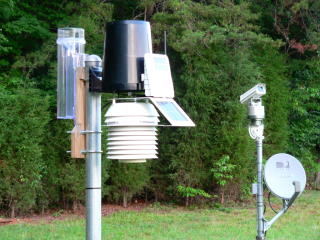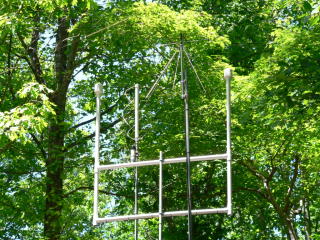Weather
Station Indoor
Equipment
|
Left: Dedicated weather
station computer running Davis Weatherlink,
Ambient Virtual Weather Station, Image Salsa and Lightning/2000
software.
Center: Davis Vantage Pro2 console.
Right: Oregon Scientific WMR968 console. |

|
Webcam
and Video
Surveillance Equipment
Left:
Web Development Workstation
Middle: Webcam and Video Surveillance
Right: Time Lapse Movie Workstation |

| The weather station and video equipment are
powered by a Trace UPS system. The UPS will run the weather station and
several other pieces of essential equipment for 24 hours without
external power. |
|
| Weather
Station Outdoor
Davis ISS
Top: Heated Rain Collector
Middle: Sensor Interface Module with Transmitter
Bottom: Fan Aspirated Radiation Shield which encloses
Outdoor Temperature and Humidity Probes
Rear: 4" (0.01" resolution) Manual Rain Gauge

The Sky Cam is visible in the background.
|
Davis
Anemometer with Remote
Transmitter Kit

|
Weather
Cams
Left: Feeder Cam
Middle: Pan/Tilt/Zoom Critter Cam With Infrared Illuminators
Right: Weather Board Cam
Upper Right: Infrared Illuminators

|
Weather
Cams - Another View

|
Sky
Cam
| The Sky Cam is an Axis 211 network camera with
a 6-60mm motorized zoom lens. The camera is
enclosed in an outdoor housing which is mounted on a motorized pan/tilt unit. The housing has window heat and fan
cooling. The camera connects to the network via a CAT 5 cable. |

| The Axis 211 has "Slow Shutter" with
exposures as long as 2 seconds. Low light performance is excellent.
Moving objects are blurred at slow shutter speeds but this isn't a
problem for sky observations. There are some minor imager defects
visible in full low light mode. More information about the Axis 211
network camera can be found here.
Below is an image of the moonlit sky captured by
the Sky Cam. |

| The weather station in the foreground and the
trees are illuminated by a couple of street lights in the neighborhood.
Most nights the sky is filled with an orange glow from the street
lights in Winston-Salem reflecting off haze in the atmosphere. On clear
nights brighter stars are visible. |
|
Boltek
Lightning Detector
| The Boltek antennas are located inside homemade
PVC enclosures made from parts obtained at a local home improvement
center. The antenna assembly is mounted on top of two 10'
sections of antenna mast. The mast is attached to the house using a pair of
heavy duty wall mounts and lag bolts. The antennas are approximately 30' above the
ground. |

|
| View of Boltek antenna inside PVC housing. The
PVC housing consists of a 3" to 1 1/2" reducer, a 3" long piece of 3"
PVC pipe and a 3" PVC pipe cap. The 3" pipe is glued into the
reducer. The pipe cap is slipped on top of the assembly after
applying some Teflon grease to the inside of the cap and on the outside
of the mating PVC pipe. DO NOT glue the cap on to
the assembly.
The Boltek antenna is secured with three
pieces of dense foam, one on the front and one on each side. The final
arrangement of the Boltek antenna is slightly different from the
picture. The foam is between the side of the antenna with the
mounting holes and the pipe. I changed the layout so I could strain
relief the antenna cable to the bottom mounting hole with a small tie
wrap. (More to come.) |

|
This is a view of the antenna
assembly with the pipe cap
partially installed.

|
Home
Made Debris Screen for
Rain Collector
| Bottom view of fine mesh kitchen strainer with
handle removed. The strainer is made of tough stainless steel. A
grinder or Dremel tool with a cutoff wheel is required to remove the
handle. The strainer was purchased at a local Walmart.
I like the rim design. The angle on the rim should
reduce the number of raindrops that splash out of the collector
compared to a flat rim.
The collector hasn't stopped up since installing
the screen but it is still necessary to clean the funnel and tipping
buckets occasionally. |
Bottom View

|
Top View

|
Strainer inside Davis
Rain Collector Funnel
 |
Psychrometers Used at tobaccovilleweather.com
A psychrometer is used to measure the "Dry Bulb" and "Wet Bulb" temperatures of air. Humidity, dew point and several other air characteristics can be derived from these temperatures.
The psychrometer is a matched pair of precision thermometers. One of the thermometers has a cloth sock or wick covering the bulb. This is the "Wet Bulb" thermometer. The other thermometer is the "Dry Bulb" thermometer.
The sock is saturated with distilled water before use. Air is passed over the thermometer bulbs either by manually slinging the thermometer assembly through the air or by pulling air over the bulbs with a fan. Water evaporates and cools the thermometer bulb as air passes over the wetted sock. After a few minutes the temperature stabilizes. This is the "Wet Bulb" temperature. The "Wet Bulb" and "Dry Bulb" temperatures are recorded. Once the temperatures are known a psychrometric chart or calculator can be used to determine humidity, dew point, etc. |
Bendix Psychron 566 Fan Aspirated Psychrometer

|
Top View

|
Top View With Thermometer Cover Removed

Notice the cloth wick on the wet bulb thermometer.
Water is applied to the wick before use. |
Bacharach Sling Psychrometer

A manual sling psychrometer requires a learned
technique to get consistent readings. |
| |

















